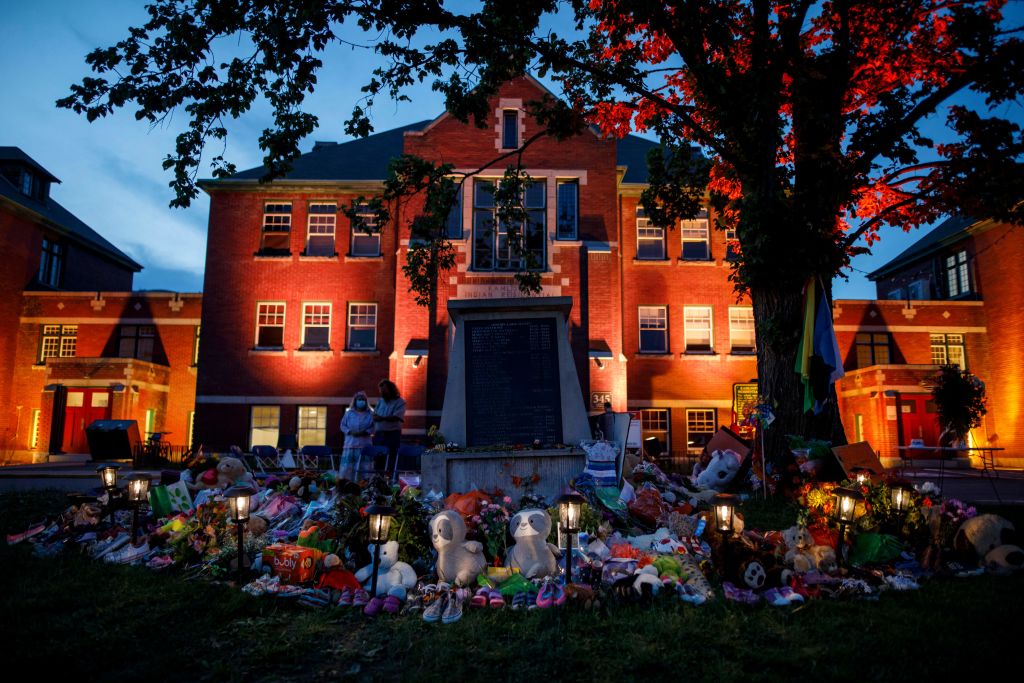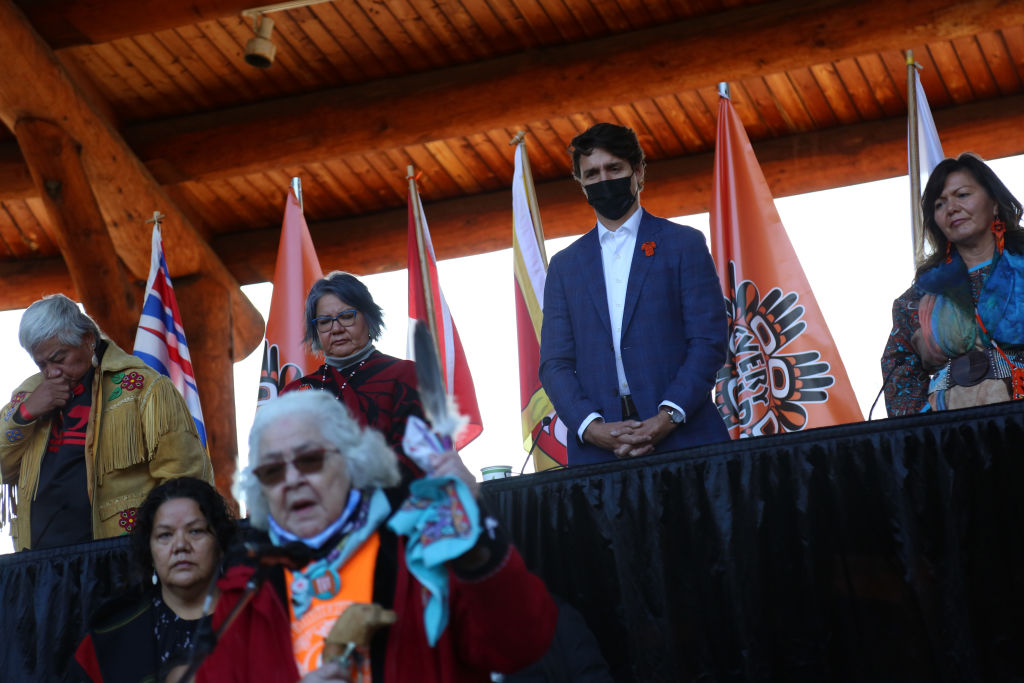Many of Wahéhshon Whitebean’s family members attended Canada’s residential schools—largely Catholic-run institutions designed to erode Indigenous culture and that were rife with abuse. So Pope Francis’s six-day trip across Canada, which began Sunday, feels personal for 39-year-old Whitebean, who attended an Indian day school, a similar institution but one in which students returned to their families in the evenings. (Pope Francis has called the tour a “pilgrimage of penance” and apologized on Monday.)
The issue is also an academic pursuit for Whitebean, who is pursuing a Ph.D. at McGill University researching Indian day schools in her home community of Kahnawà:ke, just outside of Montreal, Québec. For the last few months, Whitebean has been poring over archives and interviewing dozens of survivors from these institutions. She used to think of herself as somewhat de-sensitized to the issue but says that lately it’s been hard to hold it together while reading detailed complaints—from parents about abuses their children suffered from not being allowed to use the bathroom to having their hands burned on a stove. “I don’t know what came over me. I just started to cry. I bawled and realized at that point it was like a dam broke and all the emotion and my anger and grief was just building up for a while doing this work,” Whitebean says. “There’s no justice for us. There hasn’t been justice.”
Whitebean’s story shows how important the matter is for Indigenous peoples as Pope Francis visits various communities across Edmonton, Québec and Iqaluit in the northern territory of Nunavut. (Francis was welcomed to Canada on Sunday by Indigenous leaders as well as Prime Minister Justin Trudeau.)
Read more: What to Know About the Pope’s Visit to Canada and Apology to Indigenous Communities
The Catholic church’s role in residential schools
In 2015, Canada’s Truth and Reconciliation Commission (TRC) issued a report documenting how the nation’s policy toward Indigenous peoples amounted to “cultural genocide” through its attempts to eliminate Indigenous governments, ignore Indigenous rights and “through a process of assimilation, cause Aboriginal peoples to cease to exist as distinct legal, social, cultural, religious, and racial entities in Canada.” The report noted that a key way in which the Canadian government executed this policy was through residential schools, which more than 150,000 children have attended since the late 19th century. The Catholic church operated about 70% of residential schools in Canada, before the government took control of them in 1969. The last residential school shut in the 1990s.
In recent years, the remains of more than 1,300 people—mainly children—have been discovered using new technology on the grounds of three former residential schools in Canada, prompting an outcry. Indigenous communities say the figures confirm what they have long suspected; estimates suggest between 10,000 and 50,000 children never returned home after attending the schools.

“Deliberately going after Indigenous children as the quickest path to assimilation is just inhumane,” says Dale Turner, associate professor of political science at the University of Toronto.
“In establishing residential schools, the Canadian government essentially declared Aboriginal people to be unfit parents,” the TRC report noted. “The residential school system was based on an assumption that European civilization and Christian religions were superior to Aboriginal culture.” In these schools, children were banned from speaking their own languages and church-led campaigns prohibited Indigenous spiritual practices.
The facilities were also overcrowded, and diseases such as tuberculosis and measles wreaked deadly havoc on Indigenous children.
“When you leave a home that has structure, love and empathy to go into an institution that has no love, no compassion, very cold and in many cases physical, emotional and sexual abuse to children, it has an impact that will stay with them for their entire life—as well as the lives of their children and grandchildren,” says Angela White, executive director of the Indian Residential School Survivors Society (IRSSS). “Many of these residential school survivors went to these institutions, not knowing a parent’s love, and blaming their parents for making them go—without knowing that they were forced to go.”
For Whitebean, the older generations in her family have embraced a culture of silence around their experience at residential schools because of the trauma and shame associated with them. Her grandmother told her that her great-grandmother’s body was full of scars from residential school. She says that others in her family reported different forms of physical and sexual abuse.
What the Pope’s apology means
The Pope’s apology, which comes seven years after the TRC recommended one, will hold different weight across Indigenous communities—but for many there is a sense that it isn’t enough.
Whitebean says she has mixed feelings about the Pope’s visit. “I just don’t believe that anything practical or real or beyond lip service will come out of the visit. I don’t want any more hollow apologies,” she says.
The IRSSS’s White notes that the people her organization represents hold diverse views but personally, she’s not sure it’s enough. “They had many opportunities to provide this apology—along with accountability and transparency about their participation in how these schools were operated, so it’s too little, too late,” White says.
That’s not to say that the apology doesn’t hold greater meaning for other Indigenous peoples, a large number of whom are still Catholic. In April, while meeting with a delegation of Indigenous leaders in the Vatican, the Pope issued an historic apology for the “deplorable” abuses at residential schools. He had promised the delegation he would apologize on Canadian soil.
Indeed, the trip marks the first time a papal visit to Canada is focused on reckoning with the harm caused by the church. “To say that the Pope’s apology does not have political significance in what’s going on in contemporary politics is a mistake because I do think the Pope has an opportunity to come down on the side of Indigenous peoples here,” Turner says. “Part of that reconciliation is to recognize what they took from Indigenous people, which is those important, historical, philosophical, everyday relationships they have with their homelands.”
“This ritual needs to take place for meaningful reconciliation to take place,” Turner says, adding that it was important for it to occur on Indigenous homelands.
And the Pope’s apology is part of a growing movement towards recognizing past abuses against Indigenous peoples. Last year, Trudeau became the first Canadian prime minister to apologize for the “incredibly harmful government policy” that created the residential schooling system.

What Canada’s Indigenous communities want next
For Whitebean, it’s important that the church honor its pledge to raise funds. Some 48 local Catholic church entities were required to use their “best efforts” to fundraise 25 million Canadian dollars for survivors as part of the 2008 Indian Residential Schools Settlement Agreement (IRSSA), between the government of Canada and thousands of survivors, but ended up raising less than 4 million.
That fundraising gap set the stage for a subsequent pledge. Last year, a group of Canadian bishops announced they would set up an Indigenous Reconciliation Fund that would raise up to 30 million Canadian dollars. So far, less than 5 million has been raised.
By contrast, the IRSSA saw the federal government set up a major compensation fund for children who had been enrolled in residential schools. A 2021 report found that the government has paid out at least 3 billion Canadian dollars in compensation so far.
Whitebean says that the church should also return cultural artifacts held in the Vatican, give back land to Indigenous owners and make it easier for the public to access records related to residential and day schools. Many records are housed within individual religious orders and can still be difficult to access, according to Whitebean.
But whatever comes next, many Indigenous peoples will agree that Pope Francis did not mince his words while condemning the residential school system. “I humbly beg forgiveness for the evil committed by so many Christians against the Indigenous peoples,” he said on Monday outside a former residential school in Maskwacis, Alberta.
Correction, July 26
The original version of this story misstated the university where Dale Turner works. It is the University of Toronto, not McGill University.
More Must-Reads from TIME
- Donald Trump Is TIME's 2024 Person of the Year
- Why We Chose Trump as Person of the Year
- Is Intermittent Fasting Good or Bad for You?
- The 100 Must-Read Books of 2024
- The 20 Best Christmas TV Episodes
- Column: If Optimism Feels Ridiculous Now, Try Hope
- The Future of Climate Action Is Trade Policy
- Merle Bombardieri Is Helping People Make the Baby Decision
Write to Sanya Mansoor at sanya.mansoor@time.com